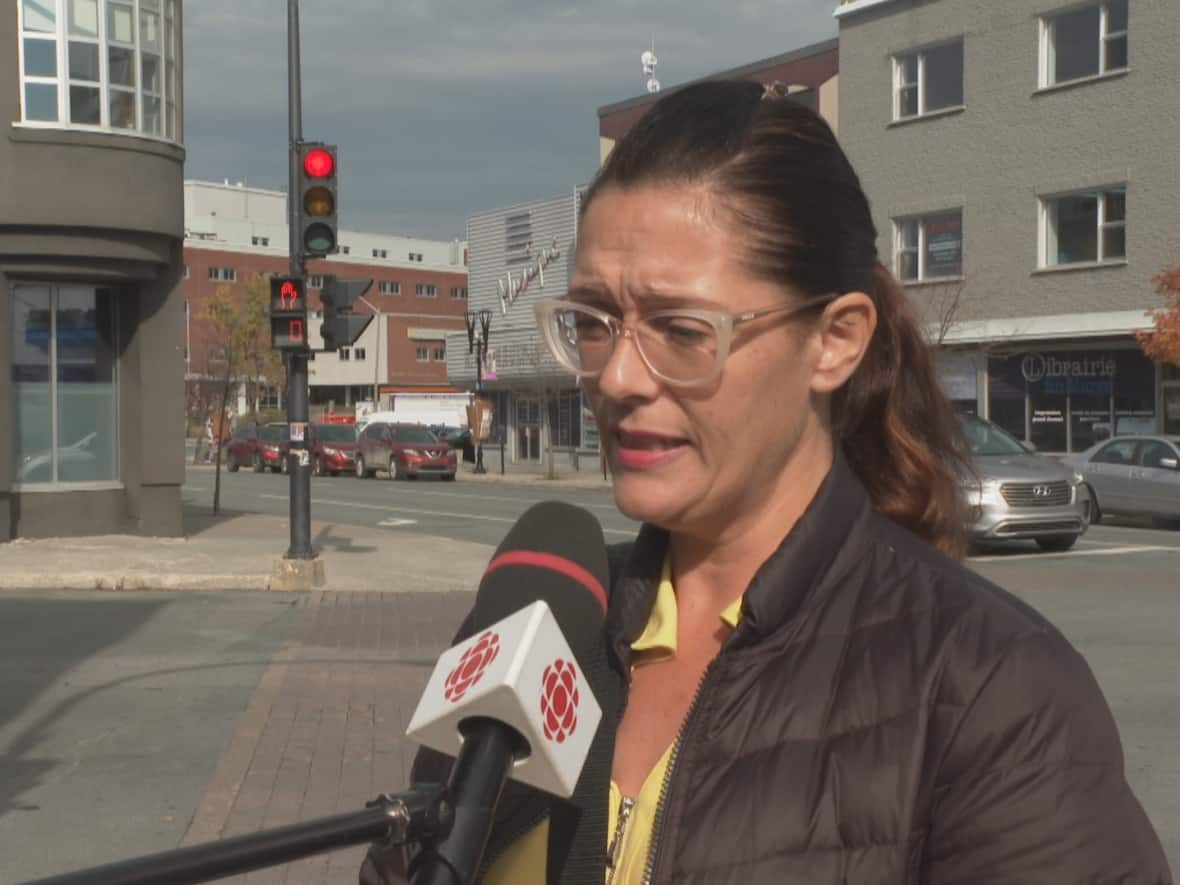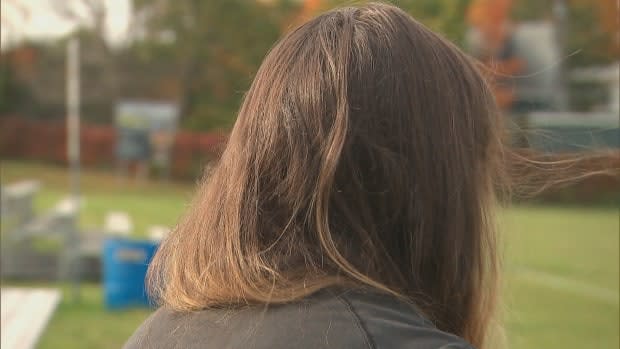These Quebec nurses are willing to sacrifice their careers to avoid getting COVID-19 shots

Some unvaccinated nurses in Quebec — who are among thousands facing suspension — told CBC News they feel it's worth losing their jobs in order to respect their principles.
The original deadline for them to get vaccinated was this Friday.
On Wednesday morning, however, Quebec Health Minister Christian Dubé postponed that deadline by a month, saying that going through with the original date would have had major effects on the quality of care in the province's health network, given the number of workers who would be suspended.
Currently, 93 per cent of Quebec health-care workers are fully vaccinated, but that still leaves almost 22,000 facing suspension because they have had only a single dose or are unvaccinated.
Those who aren't adequately vaccinated now have until Nov. 15 to avoid being suspended without pay.
On Monday, the Quebec Order of Nurses said those who don't comply with the mandate will also see their licences suspended.
WATCH | Thousands of Quebec nurses face suspension if not vaccinated for COVID-19:
According to the order, 4,338 nurses aren't yet fully vaccinated. There are also more than 5,000 nurses whose vaccination status the order is still trying to verify.
The order has more than 80,000 members.
Some of the nurses who are not yet vaccinated question those numbers, as well as the claims of scientific experts about the safety of COVID-19 vaccines. For others, the issue is one of having the freedom to exercise personal choice. And some of them are already making contingency plans.
"I don't feel that this [the vaccine] was the one and only solution. I think we went for it with a complete disregard about the freedom of choice, and then imposed it," Chantale Hébert, a nurse who works at a long-term care residence in Rouyn-Noranda, Que., told CBC in an interview Tuesday.
"Now we're getting sanctions just for believing in what we believe. I'm angry."
Delicate issue
Hébert was the only nurse who spoke to CBC who agreed to have her name used. The other two requested their names not be used for fear of being targeted online, or of losing future job opportunities.
The issue is delicate. Several unvaccinated nurses who initially agreed to speak to CBC for this story ultimately backed out.
Another nurse who works at Pontiac hospital in Shawville, Que., stressed the importance of free choice.

"I would be willing to give up my career just to feel like I have a say in my own health care, in my own decision making," said one nurse who works at Pontiac hospital in Shawville, Que., who asked that his name not be used.
"That should be a personal choice. I find it hard to be forced to throw away my vocation, my passion, because of an atrocious decision by the government," a third nurse who works for the Integrated Health and Social Services centre for Chaudière-Appalaches, Que, told Radio-Canada in French.
On Wednesday, after announcing the deadline had been pushed back, the health minister again urged them to get the shot.
"We extend our hand, and we sincerely hope you will grab ahold of it. Please, do it for yourself and for your loved ones. If not, do it for your colleagues who need you," Dubé said.
"We all have the the right to change our minds when we do it for the right reasons."
'Natural immunity'
Hébert told CBC the province was defying the basic principles of care by forcing health-care workers to be vaccinated if they want to keep working.
"It baffles me, because as nurses if we didn't allow this kind of consent from our clients, we would've had serious sanctions," she said.
Her main reason for refusing to have a COVID-19 vaccine is because she feels its efficacy hasn't been proven, and that it's unnecessary.
"The immune system itself doesn't need a vaccine to fight back. It's a natural response," Hébert said, adding she believes many people have developed a natural immunity to COVID-19.
"If vaccines were working, we wouldn't be in this situation. If vaccines were working, those who are vaccinated wouldn't fear the unvaccinated."
Such arguments have been largely debunked by scientific experts, who say the COVID-19 vaccines available in Canada are safe and effective.
WATCH | Medical lead of Manitoba's vaccine task force assures public COVID-19 vaccines are safe:
Hébert also expressed doubts about the number of deaths attributed to COVID-19, and about the number of health-care professionals who say they're vaccinated.
Concern about long-term side-effects
Other unvaccinated nurses have their own reasons.
The nurse from Shawville's main reason for refusing the vaccine was concern for his own health.
"I'm not saying that the vaccine isn't competent enough, but what I think is just so hard for them to judge is the possible long-term effects," he told.
"They put this this vaccine together in what, like 18 months? But who's to say that we know what's going to happen in five years from now?"
The nurse said he was ill with leukemia as a child and still feels adverse health effects from that today. That's made him skeptical of some medications.
"Is it even going to maybe put me at risk of developing another cancer down the road? I just don't want to put myself in that situation because I feel like I've just been through enough already," he said.
The Shawville nurse said he feels like his unvaccinated status doesn't endanger his patients, because most are double-vaccinated. He noted measures are in place to protect them, such as health-care workers wearing personal protective equipment.

The nurse from the Chaudière-Appalaches region said it should be her right to make decisions about her own health.
"I'm in good shape. I'm fine. I am not a person at risk," she said.
"Why am I going to have something imposed on my body when we don't even know what it is?"
"I've had other vaccines — tetanus, hepatitis. But I informed myself to be sure they were reliable," she said.
"But the COVID vaccine, what is it based on? I think they're not sure if this vaccine is reliable or not."
Most experts say that the COVID-19 vaccines are safe and that risks of complication are extremely rare.
'Enormous stress'
While the three nurses are firm in their decision to remain unvaccinated, they acknowledge they will pay a price.
The nurse from Chaudieres-Appalaches will be working nursing shifts right up until Thursday, but she's already found a replacement job — waiting tables at a restaurant.
That means a significant pay cut. As a nurse, she earns $35 an hour. At the restaurant, she'll earn $10.50 an hour plus tips.
"It's a big stress for sure. I base my quality of life on my salary. I am living in enormous stress," she said.
WATCH | How doctors are addressing unvaccinated people's concerns:
The nurse from Shawville noted he put five years of study and a lot of money into his education. He said he will try to find work in another field or perhaps in another jurisdiction that doesn't require health-care workers to be vaccinated.
Hébert said she would continue tending to her clients' feet in their homes once her suspension takes effect.
"People have been bullied into this. We have mortgages. We have rents to pay. We have children to feed," Hébert said.
'Stabbed in the back'
The nurses who spoke to CBC News all said they felt the Quebec government's ultimatum was a betrayal.
"It just feels like I'm getting, you know, stabbed in the back," the nurse from Shawville said. "Like all the overtime that I took for them during COVID and even before COVID. All the effort you put in to be the best nurse — It just feels like all of that was for nothing."


